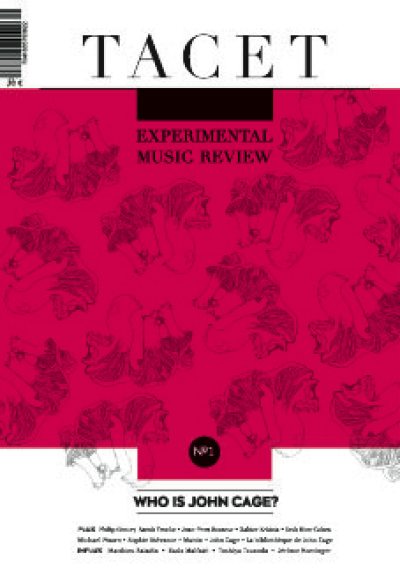TACET #1
January 19th, 2012TACET aldizkariaren lehen aleak berriki ikusi du argia. Musika esperimentalaren azterketari, komentarioari eta kritikari eskainitako aldizkari-liburua, bi hizkuntzatan argitaratu da, frantseseraz eta ingeleseraz, eta lehen ale honetako John Cagen figura hartu du oinarri. Hortarako hainbat idazle gonbidatu ditu aldizkariak: Matthieu Saladin, Philip Gentry, Sarah Troche, Toshiya Tsunoda, Jean-Yves Bosseur, Xabier Erkizia, Seth Kim-Cohen, Michael Pisaro, Sophie Stevance, Mattin, Radu Malfatti, Jérôme Noetinger, Kenneth Silverman, Julia Robinson…
Hurrengo alerako deialdi irekia egin dute.
TACET is a new research publication dedicated to experimental music.
Published annually and bilingually (French and English), its ambition is to create an interdisciplinary and international space of reflection for this music, in all its aesthetic diversity : from noise to improvisation, via electroacoustic, electronic, minimalist music,
silent, indeterminate, conceptual, sound poetry, free jazz, field recordings, sound art, etc. We should specify that the experimentation does not belong to a specific genre of music, but depends on the artistic approach that leads the practice.
TACET, as John Cage showed so well in 4’33’’, designates a moment of silence observed by an instrumentalist during the whole period of a movement. By extension, it becomes, as the title of this publication, a moment of introspection, of reflectivity and reflection, where music interrupts itself to give way to research and theoretical questioning.
TACET aims, in this way, on the side of experimental music, to contribute to the renewal of theoretical research by confronting and intersecting musicians’ speeches, studies coming from aesthetics and philosophy of art, from the critical renewal of musicology, from cultural studies and gender studies, from political thought, from social sciences and geography. In short, like the publication Source, edited by Larry Austin, at the end of the 1960s, it is there to form a space of scientific and heuristic experimentation on the different creative processes that nourish this music and its reception, and also, on larger sociocultural problems that affect it intimately. The publication does not have as its object to decrypt the supposed hidden meaning in works –such a hidden meaning does not exist, as Cornelius Cardew reminds us in a Wittgensteinian fashion–, but to interrogate modalities, the forms and how they relate to creativity in this music, its evolution, its transformation, and the relationships it maintains with the societies of which it is a part.
The publication will be developed according to four principal types of discursive movement: 1) Flux, bringing together an ensemble of in depth studies and articles responding to the principal question of each issue; 2) Influx, putting in tension the first flux by an ensemble of free reflection papers and of shorter format; 3) Afflux, inserts and points of discourse constituted by images, citations, archives and other documents, deploying themselves throughout the pages by association and resonating with the different texts; 4) Reflux, book critical reviews and work reports of recordings, performances and events relating to experimental music.For the details regarding each column, see our file instructions for authors.














![proyecto de documentación e investigación de la creación sonora experimental [UN]COMMON SOUNDS](wp-content/uploads/2010/04/uncom_blog.thumbnail.jpg)

